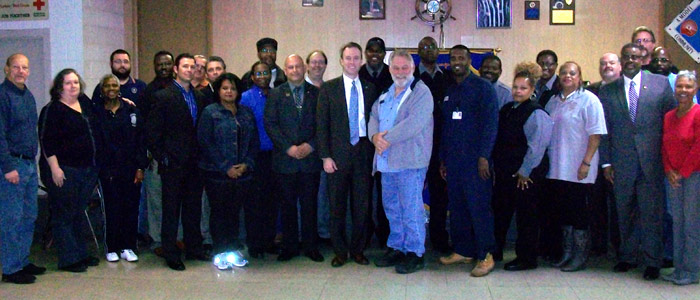Published 06 Nov, 2013

On October 30, locals from all three divisions across Ohio and Michigan convened a meeting of the Ohio/Michigan State Conference, held quarterly. Political initiatives on the table ran the gamut from impending right-to-work legislation in Ohio to a recently introduced transit worker assault bill.
Our locals in the region are expecting Ohio lawmakers to try to push through right-to-work legislation in the wake of Michigan lawmakers’ success in that effort last December. “Right-to-work is all around us in Ohio,” said TWU International Transit Representative Theotis James. “We fully expect that they will try it here because they’re trying to squash labor all over the country.”
TWU locals used the State Conference to get ready for an all-out fight, if called upon in the coming months to defeat right-to-work in Ohio. Members will be relying on the same tactics that proved successful last November in their fight against SB 5, legislation that would have curbed collective bargaining rights for public employees. In concert with sister unions, the TWU launched a massive campaign to repeal the legislation through a referendum, winning handily with 61 percent of the vote. “We’re looking to launch the same type of effort if it comes to it,” said Theotis James. “We will collect signatures and bring it to a referendum, and take down any Ohio right-to-work laws.”
Our Michigan locals are concerned that business interests are poised to turn Americans’ shock at the bankruptcy chaos in Detroit into a new tool for attacking unions across the country. Transit, Utility, Universities, and Services Division International Representative Carl Martin and Local 171 President Delisa Brown told the Conference that anti-union interests have largely succeeded in pinning the blame for the city’s economic collapse on union workers. It may not be long before employers and conservative politicians are calling for wage and benefit cuts for union workers in the name of protecting their city from a fantasy bankruptcy.
Among the bills that Michigan and Ohio locals are supporting is a House bill that would provide much-needed assault protection to Ohio’s public transit workers, and comes as a result of a number of recent attacks. The bill would classify any assault on a transit employee while performing work duties as a fifth degree felony, allowing the court to hit the offender with a $5,000 fine and six-month public transportation ban.
More than financial resources, it’s numbers that are key in regional battles. “In Oklahoma, for example, you may have 200 people in your local, but when you join a State Conference, you have 20,000 members with you,” said TWU National Director of State Conferences Terry Daniels. “That’s what the conference brings. It brings the opportunity for us all to work together for the same common cause, to stand up and support our brothers.”
Traditional grassroots activism forms the backbone of State Conference victories. “Knocking on doors, holding signs in the street, making phone calls, talking to your neighbors, going to rallies—that’s what works,” said Daniels. “When we mobilize together and create a grassroots effort to further our political goals, politicians look at our numbers and they start realizing that we act as one. They realize they need to get to know what we believe in, and that if we don’t like what they’re doing, we can vote them out.”
The State Conferences have traditionally served as a forum for our membership to talk with politicians face to face and create relationships that extend beyond election day. At the Ohio/Michigan Conference, Ohio gubernatorial candidate County Executive Ed FitzGerald and candidate for Congress Scott Warton met with our locals, asking for their support and for policy feedback. “The people who get our checks, whoever they are, we believe that the members are the faces that politicians need to see, the ones they to go to need to get the checks,” said Daniels. “We want them to know who the money came from, and what we’re expecting in return for our support.” After a vote, both candidates were endorsed by the Conference.
“In some cases, we will have to get radical and get our hands dirty,” continued Daniels, of his projections for the coming weeks. “Once the State Conference is over, it’s what we do from the time the meeting ends til the next meeting begins that matters most.”
